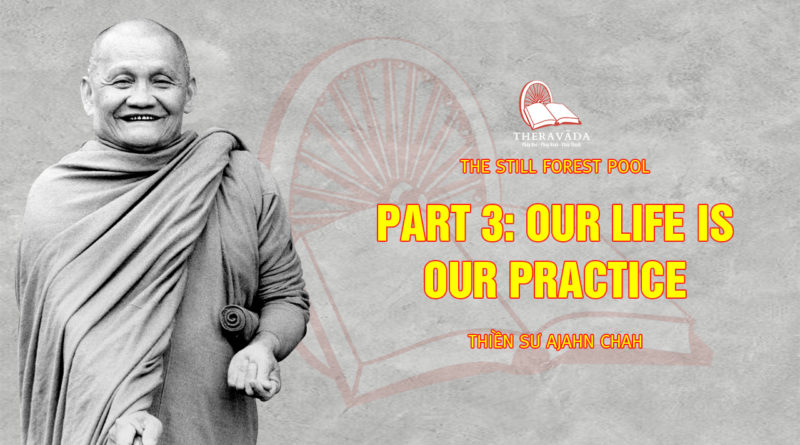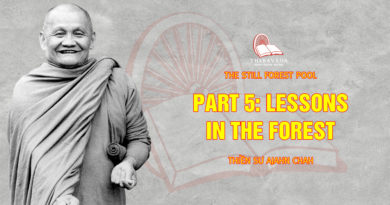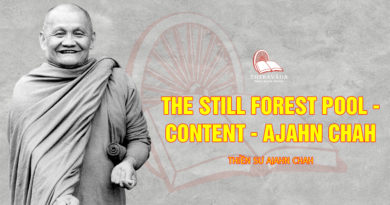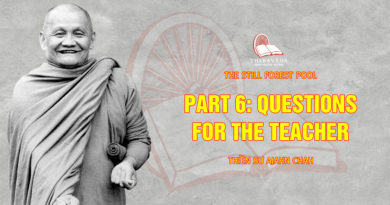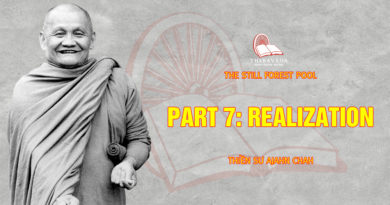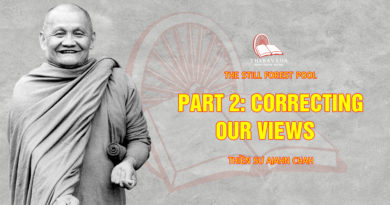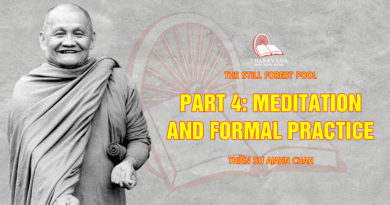PART 3
Our Life is Our Practice
Meditation is not separate from the rest of life. All situations provide opportunity to practice, to grow in wisdom and compassion. Achaan Chah teaches that the right effort for us is to be mindful in all circumstances without running away from the world but to learn to act without grasping or attachment.
Furthermore, he insists that the foundation of a spiritual life is virtue. Although virtue is neglected in our modern society, it must be understood and honoured as a fundamental part of meditation. Virtue means taking care so that we do not harm other beings by thought, word, or deed. This respect and caring puts us into a harmonious relationship with all life around us. Only when our words and deeds come from kindness can we quiet the mind and open the heart. The practice of non-harming is the way to begin turning all life situations into practice.
To further establish our lives on the Middle Way, Achaan Chah recommends moderation and self reliance. A life of excess is difficult soil for the growth of wisdom. To take care with the basics-such as moderation in eating, sleeping, and in speech-helps bring the inner life into balance. It also develops the power of self-reliance. Don’t imitate the way others practice or compare yourself to them, Achaan Chah cautions; just let them be. It is hard enough to watch your own mind, so why add the burden of judging others. Learn to use your own breath and everyday life as the place of meditation and you will surely grow in wisdom.
Meditation in Action
Proper effort is not the effort to make something particular happen. It is the effort to be aware and awake in each moment, the effort to overcome laziness and defilement, the effort to make each activity of our day meditation.
To Grasp a Snake
“Our practice here is not to grasp anything,” Achaan Chah told a new monk.
“But isn’t it necessary to hold onto things sometimes?” the monk protested.
“With the hands, yes! but not with the heart,” the teacher replied. “When the heart grasps what is painful, it is like being bitten by a snake. And when, through desire, it grasps what is pleasant, it is just grasping the tail of the snake. It only takes a little while longer for the head of the snake to come around and bite you. .
“Make this nongrasping and mindfulness the guardian of your heart, like a parent. Then your likes and dislikes will come calling like children. ‘I don’t like that, Mommy. I want more of that, Daddy.’ Just smile and say, ‘Sure, kid.’ ‘But Mommy, I really want an elephant.’ ‘Sure, kid.’ ‘I want candy. Can we go for an airplane ride?’ There is no problem if you can let them come and go without grasping.”
Something contacts the senses; like or dislike arises; and right there is delusion. Yet with mindfulness, wisdom can arise in this same experience.
Do not fear places where many things contact the senses, if you must be there. Enlightened does not mean being deaf and blind. Saying a mantra every second to block things out, you may get hit by a car. Just be mindful and do not be fooled. When others
say something is pretty, say to yourself, “It’s not.” When others say something is delicious, say to yourself, “No, it’s not.” Do not get caught in the attachments of the world or in relative judgments. Just let it all go by.
Some people are afraid of generosity. They feel that they will be exploited or oppressed, that they will not be properly caring for themselves. In cultivating generosity, we are only oppressing our greed and attachment. This allows our true nature to express itself and become lighter and freer.
Virtue
There are two levels of practice. The first is the foundation, a development of precepts, virtue, or morality in order to bring happiness, comfort, and harmony among people. The second, more intensive and unconcerned with comfort is the practice of Buddha Dharma directed solely toward awakening, toward the liberation of the heart. This liberation is the source of wisdom and compassion and the true reason for the Buddha’s teaching. Understanding these two levels is the basis for true practice.
Virtue and morality are the mother and father of the Dharma growing within us, providing it with the proper nourishment and direction.
Virtue is the basis for a harmonious world in which people can live truly as humans, not animals. Developing virtue is at the heart of our practice. It is very simple. Keep the training precepts. Do not kill, steal, lie, commit sexual misdeeds, or take intoxicants that make you heedless. Cultivate compassion and a reverence for all life. Take care with your goods, your possessions, your actions, your speech. Use virtue to make your life simple and pure. With virtue as a basis for everything you do, your mind will become kind, clear, and quiet. Meditation will grow easily in this soil. .
The Buddha said, “Refrain from what is bad, do good, and purify the heart.” Our practice, then, is to get rid of what is worthless and keep what is valuable. Do you still have anything bad or unskillful in your heart? Of course! So why not clean house?
As true practice, this getting rid of bad and cultivating good is fine, but limited. Finally, we must step over and beyond both good and bad. In the end, there is a freedom that includes all and a desirelessness from which love and wisdom naturally flow.
Right effort and virtue are not a question of what you do outwardly but of constant inner awareness and restraint. Thus, charity, if given with good intention, can bring happiness to oneself and others. But virtue must be the root of this charity for it to be pure.
When those who do not understand the Dharma act improperly, they look left and right to make sure no one is looking. How foolish! The Buddha, the Dharma, our karma, are always watching. Do you think the Buddha cannot see that far? We never really get away with anything.
Take care of your virtue as a gardener takes care of trees. Do not be attached to big and small, important and unimportant. Some people want shortcuts-they say, “Forget concentration, we’ll go straight to insight; forget virtue, we’ll start with concentration.”
We have so many excuses for our attachment. We must start right here where we are, directly and simply. When the first two steps, virtue and right views, have been completed, then the third step, uprooting defilement, will naturally occur without deliberation. When light is produced, we no longer worry about getting rid of darkness, nor do we wonder where the darkness has gone. We just know that there is light.
Following the precepts has three levels. The first is to undertake them as training rules given to us by our teachers. The second arises when we undertake and abide in them by ourselves. But for those at the highest level, the Noble Ones, it is not even necessary to think of precepts, of right or wrong. This true virtue comes from the wisdom that knows the Four Noble Truths in the heart and acts from this understanding.
The Spiral of Virtue, Concentration and Wisdom
The Buddha taught a way out of suffering-the causes of suffering and a practical path. In my practice, I just know this simple path-good in the beginning as virtue, good in the middle as concentration, good in the end as wisdom. If you carefully consider these three, you will see that they actually merge into one.
Let us then consider these three related factors. How does one practice virtue? Actually, in developing virtue, one must begin with wisdom. Traditionally, we speak of keeping precepts, establishing virtue, first. Yet for virtue to be complete, there must be wisdom to understand the full implications of virtue. To start, you must examine your body and speech, investigating the process of cause and effect. If you contemplate body and speech to see in what ways they can cause harm, you will begin to understand, control, and purify both cause and effect.
If you know the characteristics of what is skilful and unskilful in physical and verbal behaviour, you already see where to practice in order to give up what is unskilful and do what is good. When you give up wrong and set yourself right, the mind becomes firm, unswerving, concentrated. This concentration limits wavering and doubt as to body and speech. With the mind collected, when forms or sounds come, you can contemplate and see them clearly. By not letting your mind wander, you will see the nature of all experiences according to the truth. When this knowledge is continuous, wisdom arises.
Virtue, concentration, and wisdom, then, can be taken together as one. When they mature, they become synonymous-that is the Noble Path. When greed, hatred, and delusion arise, only this Noble Path is capable of destroying them.
Virtue, concentration, and wisdom can be developed in support of each other, then, like a spiral ever revolving, relying on sights, sounds, smells, tastes, touches, and mind objects. Then whatever arises, Path is always in control. If Path is strong, it destroys the defilements-greed, hatred, and ignorance. If it is’ weak, mental defilements can gain control, killing this mind of ours. Sights, sounds, and so on arise, and not knowing the truth of them, we allow them to destroy us.
Path and defilement walk side by side in this way. The student of Dharma must always contend with both of them, as if there were two persons fighting. When the Path takes control, it strengthens awareness and contemplation. If you are able to remain aware, defilement will admit defeat when it enters the contest again. If your effort is straight on the Path, it keeps destroying defilement. But if you are weak, when Path is weak, defilement takes over, bringing grasping, illusion, and sorrow. Suffering arises when virtues, concentration, and wisdom are weak.
Once suffering has arisen, that which could have extinguished these sorrows has vanished. Only virtue, concentration, and wisdom can cause Path to arise again. When these are developed, the Path starts functioning continuously, destroying the cause for the arising of suffering in each moment and each situation. This struggle continues until one side conquers, and the matter can be brought to an end. Thus, I advise practicing unceasingly.
Practice-begins here and now. Suffering and liberation, the entire Path, are here and now. The teachings, words like virtue and wisdom, only point to the mind. But these two elements, Path and defilement, compete in the mind all the way to the end of the Path. Therefore, applying the tools of practice is burdensome, difficult-you must rely on endurance, patience, and proper effort. Then true understanding will come about on its own.
Virtue, concentration, and wisdom together constitute the Path. But this Path is not yet the true teaching, not what the teacher actually wanted, but merely the Path that will take one there. For example, say you traveled the road from Bangkok to WatBa Pong; the road was necessary for your journey, but you were seeking the monastery, not the road. In the same way, we can say that virtue, concentration, and wisdom are outside the truth of the Buddha but are the road that leads to this truth. When you have developed these three factors, the result is the most wonderful peace. In this peace, sights or sounds have no power to disturb the mind. There is nothing at all left to be done. Therefore, the Buddha says to give up whatever you are holding on to, without anxiety. Then you can know this peace for yourself and will no longer need to believe anyone else. Ultimately, you will come to experience the Dharma of the Noble Ones.
However, do not try to measure your development quickly. Just practice. Otherwise, whenever the mind becomes calm, you will ask, “Is this it?” As soon as you think like this, the whole effort is lost. There are no signs to attest to your progress, like the one that says, “This is the path to WatBa Pong.” Just throw away all desires and expectations and look directly at the ways of the mind.
What Is Natural?
Claiming they want their practice to be “natural,” some people complain that this way of life does not fit their nature.
Nature is the tree in the forest. But if you build a house, it is no longer natural, is it? Yet if you learn to use the tree, making wood and building a house, it has more value to you. Or perhaps the dog is natural, running here and there, following its nose. Throw food to dogs and they rush to it, fighting each other. Is that what you want to be like?
The true meaning of natural can be discovered with our discipline and practice. This natural is beyond our habits, our conditioning, our fears. If the human mind is left to so-called natural impulses, untrained, it is full of greed, hatred, and delusion and suffers accordingly. Yet through practice we can allow our wisdom and love to grow naturally until it blossoms in any surroundings.
Moderation
Three basic points of practice to work with are sense restraint, which means taking care not to indulge and attach to sensations; moderation in eating; and wakefulness.
Sense restraint. We can easily recognize physical irregularities, such as blindness, deafness, deformed limbs, but irregularities of mind are another matter. When you begin to meditate, you see things differently. You can see the mental distortions that formerly seemed normal, and you can see danger where you did not see it before. This brings sense restraint. You become sensitive, like one who enters a forest or jungle and becomes aware of danger from poisonous creatures, thorns, and so forth. One with a raw wound is likewise more aware of danger from flies and gnats. For one who meditates, the danger is from sense objects. Sense restraint is thus necessary; in fact, it is the highest kind of virtue.
Moderation in eating. It is easy to fast, more difficult to eat little or in moderation as a meditation. Instead of frequent fasting, learn to eat with mindfulness and sensitivity to your needs, learn to distinguish needs from desires.
Pushing the body is not in itself self-torment. Going . without sleep or without food may seem extreme at times, but it can have value. We must be willing to
resist laziness and defilement, to stir them up and watch them. Once these are understood, such practices are no longer necessary. This is why we should eat, sleep, and talk little-for the purpose of opposing our desires and making them reveal themselves.
Wakefulness. To establish awareness, effort is required constantly, not just when you feel diligent. Even if you meditate all night at times, it is not correct practice if at other times you still follow your laziness. Constantly watch over the mind as a parent watches over a child. Protect it from its own foolishness,. teach it what is right.
It is incorrect to think that at certain times you do not have the opportunity to meditate. You must constantly make the effort to know yourself; it is as necessary as your breathing, which continues in all situations. If you do not like certain activities, such as . chanting or working, and give up on them as meditation, you will never learn wakefulness.
Rely on Yourself
The Buddha taught that those who wish to know must realize the truth for themselves. Then it makes no difference whether .others criticize or praise you whatever they say, you will be undisturbed. If a person has no trust in himself, when someone calls him bad, he will feel he is bad accordingly. What a waste of time! If people call you bad, just examine yourself. If they are not correct, just ignore them; if they are correct, learn from them. In either case, why get angry? If you can see things this way, you will really be at peace. There will be nothing wrong, there will be only Dharma. If you really use the tools the Buddha gave us, you need never envy others. Whereas lazy people want to just listen and believe, you will be self-sufficient, able to earn your living by your own efforts.
To practice using only your own resources is troublesome because they are your own. You once thought practice was difficult because you were contending, grabbing at others’ goods. Then the Buddha taught you to work with your own, and you thought everything would be fine. Now you find that too is difficult, so the Buddha teaches you further. If you cling and grasp at something, it does not matter whose it is. If you reach out and grab a fire in your neighbour’s house, the fire will be hot; if you grab a fire in your own house, that, too, will be hot. So don’t grab at anything.
This is how I practice-what is called the direct way. I do not contend with anyone. If you bring scriptures or psychology to argue with me, I will not argue. I will just show you cause and effect, to let you understand the truth of practice. We must all learn to rely on ourselves.
Don’t Imitate
We have to be aware of how people tend to imitate their teachers. They become copies, prints, castings. It is like the story of the king’s horse trainer. The old trainer died, so the king hired a new trainer. Unfortunately, this man limped when he walked. New and beautiful horses were brought to him, and he trained them exquisitely-to run, to canter, to pull carriages. But each of the new stallions developed a limp. Finally, the king summoned the trainer, and seeing him limp as he entered the court, he understood every thing and immediately hired a new trainer.
As teachers, you must be aware of the force of the examples you set. And, even more important, as students, you must not follow the image, the outer form, of your teacher. He is pointing you back to your own inner perfection. Take the inner wisdom as your model, and do not imitate his limp.
Know Yourself-Know Others
Know your own mind and body, and you will know others’ as well. One’s facial expressions, speech, gestures, actions, all stem from one’s state of mind. A Buddha, an enlightened being, can read these because he has experienced and seen with wisdom the states of mind that underlie them, just as wise older people, having passed through childhood, can understand the ways of children. .
This self-knowledge differs from memory. An old person can be clear inside but fuzzy in regard to external things. Book learning may be very difficult for him, he forgets names and faces, and so on. Maybe he knows very well that he wants a basin, but because of the weakness of his memory, he may ask for a glass instead.
If you see states rising and falling in the mind and do not cling to the process, letting go of both happiness and suffering, mental rebirths become shorter and shorter. Letting go, you can even fall into hell states without too much disturbance, because you know the impermanence of them. Through right practice, you allow your .old karma to wear itself out. Knowing how things arise and pass away, you can just be aware and let them run their course. It is like having two trees: if you fertilize and water one and do not take care of the other, there is no question which one will grow and which one will die.
Let Others Be
Do not find fault with others. If they behave wrongly, there is no need to make yourself suffer. If you point out to them what is correct and they do not practice accordingly, leave it at that.
When the Buddha studied with various teachers, he realized that their ways were lacking, but he did not disparage them. Studying with humility and respect, he benefited from his relationship with them, yet he realized that their systems were not complete. Still, as he had not yet become enlightened, he did not criticize or attempt to teach them. After he found enlightenment, he respectfully remembered those he had studied with and wanted to share his newfound knowledge with them.
Real Love
Real love is wisdom. What most people think of as love is just an impermanent feeling. If you have a nice taste every day, you will soon get tired of it. In the same way, such love eventually turns into hatred and sorrow. Such worldly happiness involves clinging and is always tied up with suffering, which comes like the policeman following the thief.
Nevertheless, we cannot suppress nor forbid such feelings. We just should not cling to or identify with them but should know them for what they are. Then Dharma is present. One loves another, yet eventually the beloved leaves or dies. To lament and think longingly, grasping after that which has changed, is suffering, not love. When we are at one with this truth and no longer need or desire, wisdom and the real love that transcends desire fill our world.
Learning Through Life
Boredom is not a real problem; if we look closely we can see that the mind is always active. Thus, we always have work to do.
Relying on yourself to do little things-like cleaning up carefully after the meal, doing chores gracefully and mindfully, not banging on kettles-helps develop concentration and makes practice easier. It can also indicate to you whether or not you have really established mindfulness or are still getting lost in defilement.
You Westerners are generally in a hurry; therefore, you will have greater extremes of happiness, suffering, and defilement. If you practice correctly, the fact that you have to deal with many problems can be a source of deep wisdom later on.
Oppose Your Mind
Consider the Buddha’s compassion and skill. He taught us after his own enlightenment. Finished with his own business, he got involved in ours, teaching us all these wonderful means. Concerning practice I have followed him, I have made all efforts in seeking, giving up my life to it because I believe in what the Buddha taught-that Path, fruition, and Nirvana exist. But these things are not accidental. They arise from right practice, from right effort, from being bold, daring to train, to think, to adapt, to do. This effort involves opposing your own mind.
The Buddha says not to trust the mind because it is defiled, impure, does not yet embody virtue or Dharma. In all the different practices we do, we must therefore oppose this mind. When the mind is opposed, it becomes hot and distressed, and we begin to wonder whether we are on the right path. Because practice interferes with defilement, with desire, we suffer and may even decide to stop practicing. The Buddha, however, taught that this is the correct practice and that defilement, not you, is the one that is inflamed. Naturally, such practice is difficult.
Some meditation monks only seek the Dharma according to words and books. Of course, when it is time for study, study according to the text. But when you are “fighting” with defilement, fight outside the
text. If you fight according to a model, you will not be able to stand up to the enemy. The texts only provide an example and can cause you to lose yourself because they are based on memories and concepts. Conceptual thinking creates illusion and embellishment and can take you to the heavens and hells, to the far reaches of imagination, beyond the simple truth here in front of you.
If you undertake the training, you will find that at first, physical solitude is important. When you come to live in seclusion, you can think of Sariputta’s advice to monks concerning physical seclusion, mental seclusion, and seclusion from defilement and temptation. He taught that physical seclusion is the cause for the arising of mental seclusion, and mental seclusion is the cause for the arising of seclusion from defilement. Of course, if your heart is calm, you can live anywhere, but in first beginning to know Dharma, physical seclusion is invaluable Today, or any day, go and sit far away from the village. Try it, staying alone. Or go to some fearful hilltop by yourself. Then you can begin to know what it is really like to look at yourself.
Whether or not there is tranquility, do not be concerned. As long as you are practicing, you are creating right causes and will be able to make use of whatever arises. Do not be afraid that you will not succeed, will not become tranquil. If you practice sincerely, you must grow in Dharma. Those who seek will see, just as those who eat will be satisfied.
Just Let Go
Do everything with a mind that lets go. Do not expect any praise or reward. If you let go a little, you will have a little peace. If you let go a lot, you will have a lot of peace. If you let go completely, you will know complete peace and freedom. Your struggles with the world will have come to an end.
____________________

